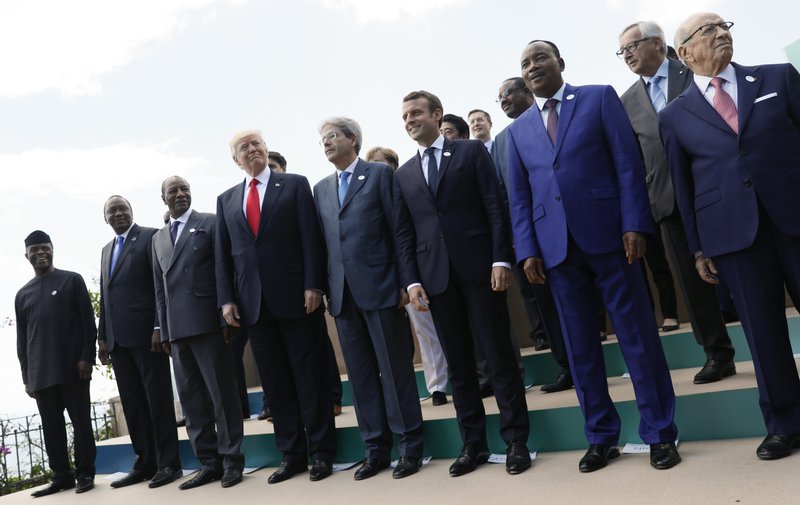TAORMINA, Sicily — Seven wealthy democracies ended their summit Saturday in Italy without unanimous agreement on climate change, as the Trump administration plans to take more time to say whether the U.S. is going to remain in the Paris accord on limiting greenhouse gas emissions.
The other six nations in the Group of Seven agreed to stick with their commitment to implement the 2015 Paris deal that aims to slow down global warming.
The final G-7 statement, issued after two days of talks in the seaside town of Taormina, said the U.S. "is in the process of reviewing its policies on climate change and on the Paris agreement and thus is not in a position to join the consensus on these topics."
Trump tweeted he would decide on Paris next week. The announcement on the final day of the U.S. president's first international trip comes after he declined to commit to staying in the sweeping climate deal, resisting intense international pressure from his peers at the summit.
PRESIDENT TRUMP: Timeline, appointments, executive orders + guide to actions in first 100 days
Italian Prime Minister Paolo Gentiloni, who chaired the meeting, said the other six "won't change our position on climate change one millimeter. The U.S. hasn't decided yet. I hope they decide in the right way."
Gentiloni said climate was "not a minor point" and that he hoped the United States would decide "soon and well" because the Paris accords "need the contribution of the United States."
French President Emmanuel Macron also chimed in on the climate issue, praising Trump's "capacity to listen." Macron said he told Trump it is "indispensable for the reputation of the United States and the interest of the Americans themselves that the United States remain committed" to the Paris climate agreement.
German Chancellor Angela Merkel was more downbeat, calling the G-7 climate talks "very difficult, if not to say, very unsatisfactory."
Trump held no news conferences during his nine-day overseas trip, allowing him to avoid questions about investigations into his campaign's ties with Russian officials. His top economic and national security advisers refused to answer questions during a press briefing Saturday.
The G-7 leaders had better luck finding agreement on the other problematic topic at the summit, trade.
They restored a vow to fight protectionism — the use of import taxes and skewed regulations that favor domestic producers over their foreign competitors. The no-protectionism pledge had been a part of previous G-7 statements but was omitted after a meeting of the group's finance ministers' earlier this month in Bari, Italy. This time the G-7 leaders reiterated a "commitment to keep our markets open and to fight protectionism."
The Trump administration has argued that trade must be balanced and fair as well as free. His Treasury secretary, Steven Mnuchin, has said the United States reserves the right to be protectionist if trade arrangements are unfair to U.S. companies and workers.
Trump's position appeared to be addressed by new language that said the member countries would be "standing firm against all unfair trade practices."
Japanese Prime Minister Shinzo Abe said the G-7 also agreed to step up pressure on North Korea, including sanctions. He told reporters it was the first time that the G-7 had recognized the North Korean threat as a priority issue.
"The threat has entered a new stage (as North Korea tests missiles and nuclear weapons) ... there is a danger it can spread like a contagious disease," Abe said.
The leaders also agreed on two other topics: closer cooperation against terrorism in the wake of the concert bombing in Manchester that killed 22 people, and on the possibility of putting more sanctions against Russia over its conflict with Ukraine if Russian behavior requires that.
Alden Meyer, the director of strategy and policy for the Union of Concerned Scientists, an advocacy group in Washington, said the discord over climate change was unusual for G-7 meetings.
"There have been differences, to be sure, in some past summits, but not a sharp open split like this," he said.
Meyer said many U.S. states, cities, and companies are moving forward on climate action while the Trump administration is "waffling" on the Paris Agreement.
"President Trump should join these leaders in protecting Americans from the mounting impacts of climate change and reaping the economic benefits of the clean energy revolution, rather than trying to shore up the flagging fortunes of the polluting coal and oil industries," Meyer said.
The G-7 is an informal gathering that meets every year under a rotating chairmanship. Its decisions are not binding as an international treaty would be, simply representing the leaders' political commitment to carry through on their collective decisions. The member countries are: Canada, France, Italy, Japan, Germany, the United States and the UK. The European Union also attends.
